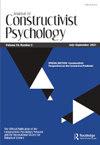价值解释的多样性:施瓦茨基本价值理论的建构主义研究
IF 0.7
4区 心理学
Q3 PSYCHOLOGY, CLINICAL
引用次数: 3
摘要
摘要基本价值的施瓦茨理论是心理学研究的主导模式。然而,很少有研究定性地探讨人们如何理解价值类型。我们提出了一种方法来研究这一点,将重点放在新兴成年期,这是一个探索的发展期。此外,与会者所处的背景是以过渡为特征的巴尔干社会。基于个人建构理论,我们探索了对价值观的潜在解释、价值观的从属建构、多样性、效价以及与该理论中提出的定义的相似性。我们使用了金字塔来提示从属于十个值中每一个值的构造。我们应用主题分析来识别281名参与者的5866份回复中的从属结构。研究结果表明,参与者通过涉及具体行动、感受和个性特征的结构来理解抽象价值观。这些值随次级构造的数量及其与概念定义的偏离程度而变化。价值观的内涵或可取性也存在差异。结果表明,除了普遍主义之外,所有的价值观都有一个从属结构来表达价值观的负面。这项研究提供了一种更加情境化和内容导向的价值观方法,并对未来的研究有启示。本文章由计算机程序翻译,如有差异,请以英文原文为准。
The Diversity of Value Construal: A Constructivist Approach to the Schwartz Theory of Basic Values
Abstract The Schwartz theory of basic values is the leading model in psychological research. However, few studies qualitatively approach how people make sense of value types. We propose a way to investigate this by focusing on emerging adulthood, a developmental period of exploration. Furthermore, participants are situated in the context of Balkan societies that are characterized by transitions. Relying on personal construct theory, we explored potential interpretations of values, their subordinate constructs, diversity, valence, and similarity to the definitions proposed in the theory. We used pyramiding in order to prompt constructs subordinate to each of the ten values. We applied thematic analysis to identify subordinate constructs in the 5866 responses obtained from 281 participants. The results show that participants understand abstract values through constructs that refer to specific actions, feelings, and personality traits. The values varied in the number of subordinate constructs and the degree of their deviation from the conceptual definition. There are also differences in the connotations of values or their desirability. Results show that all values, except Universalism, have a subordinate construct that expresses the negative side of the value. This study offers a more contextualized and content-oriented approach to values and has implications for future studies.
求助全文
通过发布文献求助,成功后即可免费获取论文全文。
去求助
来源期刊

Journal of Constructivist Psychology
PSYCHOLOGY, CLINICAL-
CiteScore
2.40
自引率
0.00%
发文量
22
期刊介绍:
Psychology and related disciplines throughout the human sciences and humanities have been revolutionized by a postmodern emphasis on the role of language, human systems, and personal knowledge in the construction of social realities. The Journal of Constructivist Psychology is the first publication to provide a professional forum for this emerging focus, embracing such diverse expressions of constructivism as personal construct theory, constructivist marriage and family therapy, structural-developmental and language-based approaches to psychology, and narrative psychology.
 求助内容:
求助内容: 应助结果提醒方式:
应助结果提醒方式:


